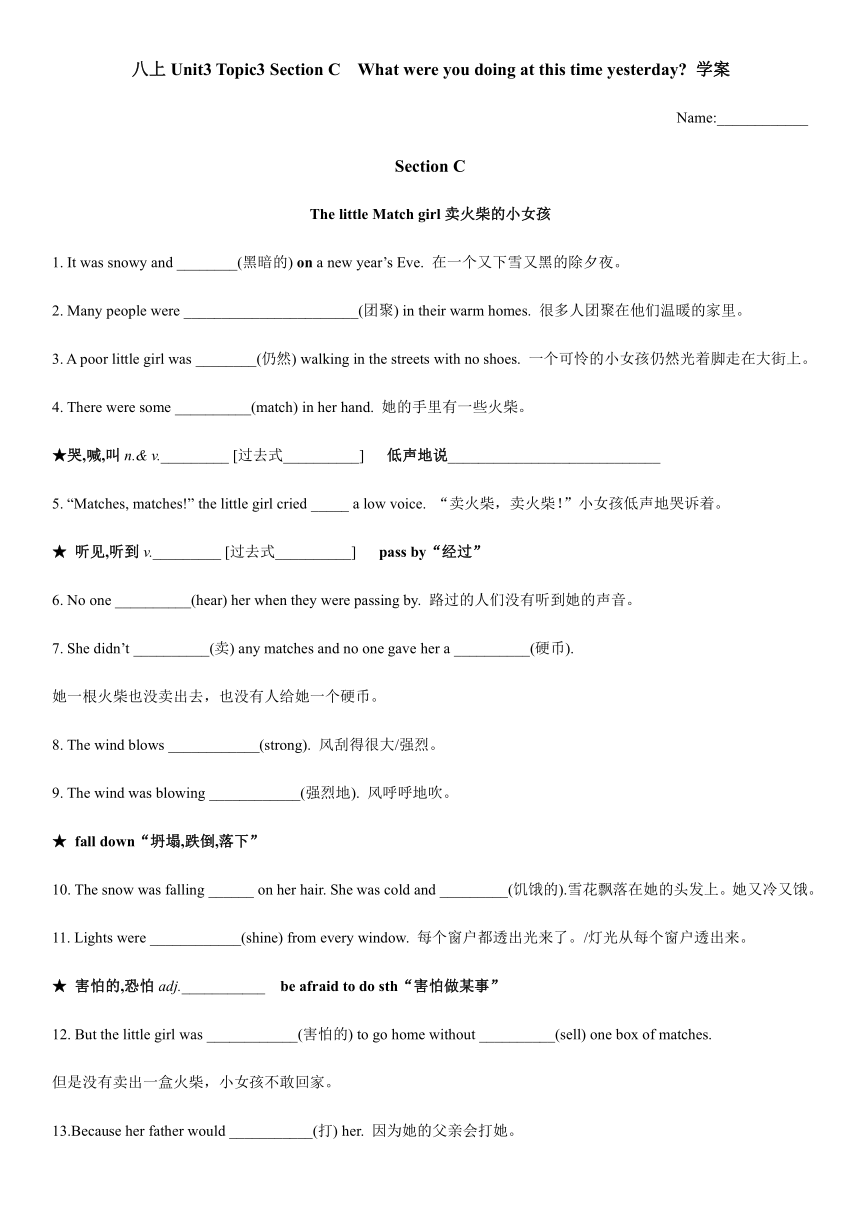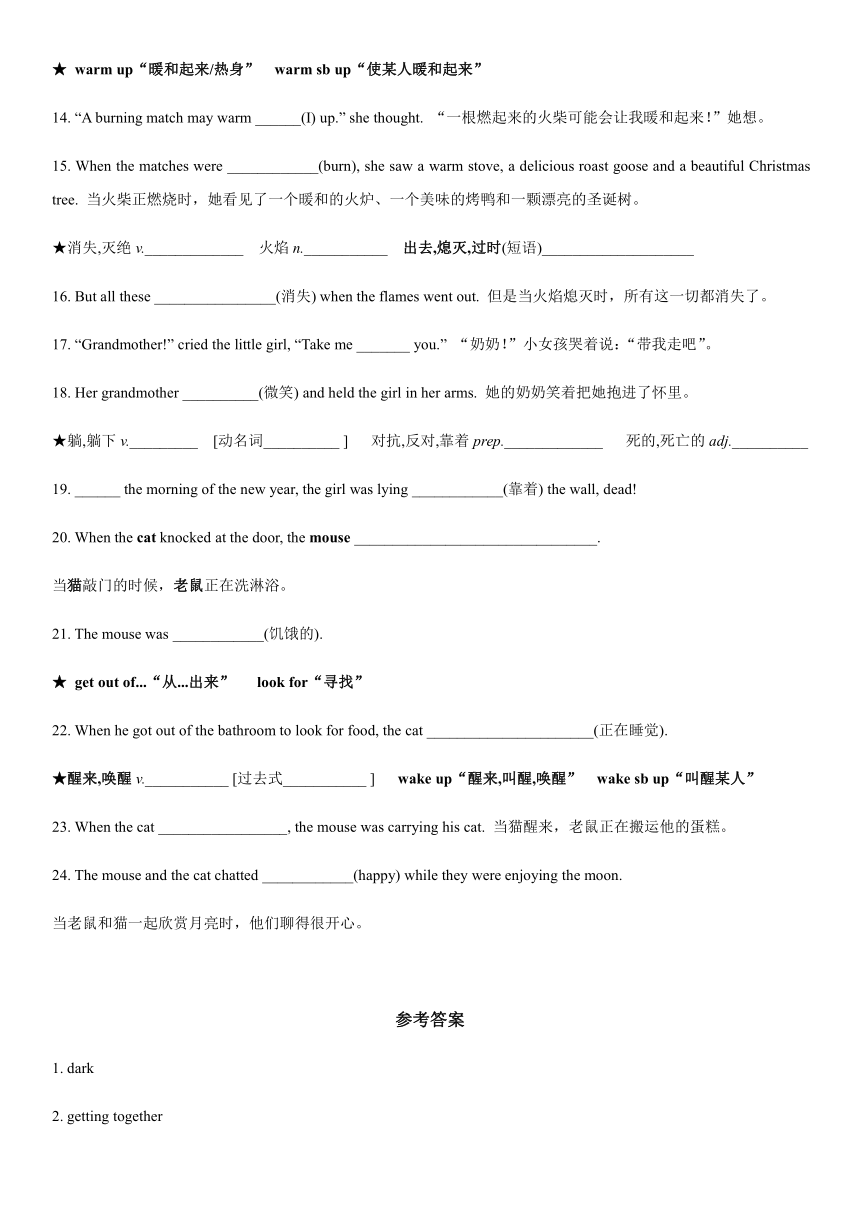仁爱版英语八年级上册Unit 3 Our Hobbies Topic 3 What were you doing at this time yesterday?CD 同步学案(含答案)
文档属性
| 名称 | 仁爱版英语八年级上册Unit 3 Our Hobbies Topic 3 What were you doing at this time yesterday?CD 同步学案(含答案) |

|
|
| 格式 | zip | ||
| 文件大小 | 16.4KB | ||
| 资源类型 | 教案 | ||
| 版本资源 | 仁爱科普版 | ||
| 科目 | 英语 | ||
| 更新时间 | 2020-07-23 16:44:29 | ||
图片预览


文档简介
八上Unit3
Topic3
Section
C
What
were
you
doing
at
this
time
yesterday?
学案
Name:____________
Section
C
The
little
Match
girl卖火柴的小女孩
1.
It
was
snowy
and
________(黑暗的)
on
a
new
year’s
Eve.
在一个又下雪又黑的除夕夜。
2.
Many
people
were
_______________________(团聚)
in
their
warm
homes.
很多人团聚在他们温暖的家里。
3.
A
poor
little
girl
was
________(仍然)
walking
in
the
streets
with
no
shoes.
一个可怜的小女孩仍然光着脚走在大街上。
4.
There
were
some
__________(match)
in
her
hand.
她的手里有一些火柴。
★哭,喊,叫n.&
v._________
[过去式__________]
低声地说____________________________
5.
“Matches,
matches!”
the
little
girl
cried
_____
a
low
voice.
“卖火柴,卖火柴!”小女孩低声地哭诉着。
★
听见,听到v._________
[过去式__________]
pass
by“经过”
6.
No
one
__________(hear)
her
when
they
were
passing
by.
路过的人们没有听到她的声音。
7.
She
didn’t
__________(卖)
any
matches
and
no
one
gave
her
a
__________(硬币).
她一根火柴也没卖出去,也没有人给她一个硬币。
8.
The
wind
blows
____________(strong).
风刮得很大/强烈。
9.
The
wind
was
blowing
____________(强烈地).
风呼呼地吹。
★
fall
down“坍塌,跌倒,落下”
10.
The
snow
was
falling
______
on
her
hair.
She
was
cold
and
_________(饥饿的).雪花飘落在她的头发上。她又冷又饿。
11.
Lights
were
____________(shine)
from
every
window.
每个窗户都透出光来了。/灯光从每个窗户透出来。
★
害怕的,恐怕adj.___________
be
afraid
to
do
sth“害怕做某事”
12.
But
the
little
girl
was
____________(害怕的)
to
go
home
without
__________(sell)
one
box
of
matches.
但是没有卖出一盒火柴,小女孩不敢回家。
13.Because
her
father
would
___________(打)
her.
因为她的父亲会打她。
★
warm
up“暖和起来/热身”
warm
sb
up“使某人暖和起来”
14.
“A
burning
match
may
warm
______(I)
up.”
she
thought.
“一根燃起来的火柴可能会让我暖和起来!”她想。
15.
When
the
matches
were
____________(burn),
she
saw
a
warm
stove,
a
delicious
roast
goose
and
a
beautiful
Christmas
tree.
当火柴正燃烧时,她看见了一个暖和的火炉、一个美味的烤鸭和一颗漂亮的圣诞树。
★消失,灭绝v._____________
火焰n.___________
出去,熄灭,过时(短语)____________________
16.
But
all
these
________________(消失)
when
the
flames
went
out.
但是当火焰熄灭时,所有这一切都消失了。
17.
“Grandmother!”
cried
the
little
girl,
“Take
me
_______
you.”
“奶奶!”小女孩哭着说:“带我走吧”。
18.
Her
grandmother
__________(微笑)
and
held
the
girl
in
her
arms.
她的奶奶笑着把她抱进了怀里。
★躺,躺下v._________
[动名词__________
]
对抗,反对,靠着prep._____________
死的,死亡的adj.__________
19.
______
the
morning
of
the
new
year,
the
girl
was
lying
____________(靠着)
the
wall,
dead!
20.
When
the
cat
knocked
at
the
door,
the
mouse
________________________________.
当猫敲门的时候,老鼠正在洗淋浴。
21.
The
mouse
was
____________(饥饿的).
★
get
out
of...“从...出来”
look
for“寻找”
22.
When
he
got
out
of
the
bathroom
to
look
for
food,
the
cat
______________________(正在睡觉).
★醒来,唤醒v.___________
[过去式___________
]
wake
up“醒来,叫醒,唤醒”
wake
sb
up“叫醒某人”
23.
When
the
cat
_________________,
the
mouse
was
carrying
his
cat.
当猫醒来,老鼠正在搬运他的蛋糕。
24.
The
mouse
and
the
cat
chatted
____________(happy)
while
they
were
enjoying
the
moon.
当老鼠和猫一起欣赏月亮时,他们聊得很开心。
参考答案
1.
dark
2.
getting
together
3.
still
4.
matches
★
cry,
cried,
say
in
a
low
voice
5.
in
★
hear,
heard
6.
heard
7.
sell,
coin
8.
strongly
9.
strongly
10.
down,
hungry
11.
shining
★
afraid
12.
afraid,
selling
13.
hit
14.
me
15.
burning
★
disappear,
flame,
go
out
16.
disappeared
17.
with
18.
smiled
★
lie,
lying,
against,
dead
19.
On,
against
20.
was
taking
a
shower
21.
hungry
22.
was
sleeping
★
wake,
woke
23.
woke
up
24.
happily
Section
D
A
short
history
of
weekend周末简史
1.
Before
1800,
many
people
____________(花费)
one
day
at
church.
在1800年以前,很多人们在教堂花一天的时间。
2.
In
England,
people
__________(称呼)
it
a
“holy
day”.
在英格兰,人们称它为“神圣的日子”。
3.
_____
that
day,
they
rested
and
prayed.
在那一天,他们休息和祈祷。
4.____________(然而),
many
workers
played
games
and
had
fun
on
that
day.
然而,很多工人在那一天玩耍游戏,找乐子。
★
“too...to...”意为“太...以至于不能...”
5.
You
are
too
young
to
go
to
school.
你太小了,不能去上学。
6.
They
felt
too
________(累)
to
work
_____
Monday
morning.
在周一上午他们感觉很累,不能上班。
7.
In
the
USA,
workers
called
them
“blue
Mondays”.
在美国,工人们称之为“忧郁星期一”。
★回答问题__________________________
解决问题______________________________
8.
To
_________(解决)
the
problem
of
“blue
Mondays”,
the
English
made
Saturday
afternoon
a
holiday
in
1874.
为了解决“忧郁星期一”的问题,英国人在1874年把周六下午定为假日。
★
stop
to
do
sth停下来去做某事
stop
doing
sth停止正在做的事
9.
At
one
o’clock,
everyone
stopped
____________(work).
在1点钟,所有人停止工作。
★
the
beginning
of...“...的开始/开端”
at
the
beginning
of...“在...的开始/开端”
10.
This
was
the
beginning
of
the
idea
of
the
_____________(周末)
in
England.
这就是英格兰周末这一概念的开端。
11.
By
1940,
offices
and
______________(工厂)
in
the
USA
were
___________(关闭的)
all
day
on
Saturdays.
到了1940年,美国的办公室和工厂都在周六这一天全天停工。
12.
And
the
_________________(两天的)
weekend
began.
两天的假期开始了。
参考答案
1.
spent
2.
called
3.
On
4.
However
6.
tired,
on
★
answer
the
question,
solve
the
problem
8.
solve
9.
working
10.
weekend
11.
factories,
closed
12.
two-day
Topic3
Section
C
What
were
you
doing
at
this
time
yesterday?
学案
Name:____________
Section
C
The
little
Match
girl卖火柴的小女孩
1.
It
was
snowy
and
________(黑暗的)
on
a
new
year’s
Eve.
在一个又下雪又黑的除夕夜。
2.
Many
people
were
_______________________(团聚)
in
their
warm
homes.
很多人团聚在他们温暖的家里。
3.
A
poor
little
girl
was
________(仍然)
walking
in
the
streets
with
no
shoes.
一个可怜的小女孩仍然光着脚走在大街上。
4.
There
were
some
__________(match)
in
her
hand.
她的手里有一些火柴。
★哭,喊,叫n.&
v._________
[过去式__________]
低声地说____________________________
5.
“Matches,
matches!”
the
little
girl
cried
_____
a
low
voice.
“卖火柴,卖火柴!”小女孩低声地哭诉着。
★
听见,听到v._________
[过去式__________]
pass
by“经过”
6.
No
one
__________(hear)
her
when
they
were
passing
by.
路过的人们没有听到她的声音。
7.
She
didn’t
__________(卖)
any
matches
and
no
one
gave
her
a
__________(硬币).
她一根火柴也没卖出去,也没有人给她一个硬币。
8.
The
wind
blows
____________(strong).
风刮得很大/强烈。
9.
The
wind
was
blowing
____________(强烈地).
风呼呼地吹。
★
fall
down“坍塌,跌倒,落下”
10.
The
snow
was
falling
______
on
her
hair.
She
was
cold
and
_________(饥饿的).雪花飘落在她的头发上。她又冷又饿。
11.
Lights
were
____________(shine)
from
every
window.
每个窗户都透出光来了。/灯光从每个窗户透出来。
★
害怕的,恐怕adj.___________
be
afraid
to
do
sth“害怕做某事”
12.
But
the
little
girl
was
____________(害怕的)
to
go
home
without
__________(sell)
one
box
of
matches.
但是没有卖出一盒火柴,小女孩不敢回家。
13.Because
her
father
would
___________(打)
her.
因为她的父亲会打她。
★
warm
up“暖和起来/热身”
warm
sb
up“使某人暖和起来”
14.
“A
burning
match
may
warm
______(I)
up.”
she
thought.
“一根燃起来的火柴可能会让我暖和起来!”她想。
15.
When
the
matches
were
____________(burn),
she
saw
a
warm
stove,
a
delicious
roast
goose
and
a
beautiful
Christmas
tree.
当火柴正燃烧时,她看见了一个暖和的火炉、一个美味的烤鸭和一颗漂亮的圣诞树。
★消失,灭绝v._____________
火焰n.___________
出去,熄灭,过时(短语)____________________
16.
But
all
these
________________(消失)
when
the
flames
went
out.
但是当火焰熄灭时,所有这一切都消失了。
17.
“Grandmother!”
cried
the
little
girl,
“Take
me
_______
you.”
“奶奶!”小女孩哭着说:“带我走吧”。
18.
Her
grandmother
__________(微笑)
and
held
the
girl
in
her
arms.
她的奶奶笑着把她抱进了怀里。
★躺,躺下v._________
[动名词__________
]
对抗,反对,靠着prep._____________
死的,死亡的adj.__________
19.
______
the
morning
of
the
new
year,
the
girl
was
lying
____________(靠着)
the
wall,
dead!
20.
When
the
cat
knocked
at
the
door,
the
mouse
________________________________.
当猫敲门的时候,老鼠正在洗淋浴。
21.
The
mouse
was
____________(饥饿的).
★
get
out
of...“从...出来”
look
for“寻找”
22.
When
he
got
out
of
the
bathroom
to
look
for
food,
the
cat
______________________(正在睡觉).
★醒来,唤醒v.___________
[过去式___________
]
wake
up“醒来,叫醒,唤醒”
wake
sb
up“叫醒某人”
23.
When
the
cat
_________________,
the
mouse
was
carrying
his
cat.
当猫醒来,老鼠正在搬运他的蛋糕。
24.
The
mouse
and
the
cat
chatted
____________(happy)
while
they
were
enjoying
the
moon.
当老鼠和猫一起欣赏月亮时,他们聊得很开心。
参考答案
1.
dark
2.
getting
together
3.
still
4.
matches
★
cry,
cried,
say
in
a
low
voice
5.
in
★
hear,
heard
6.
heard
7.
sell,
coin
8.
strongly
9.
strongly
10.
down,
hungry
11.
shining
★
afraid
12.
afraid,
selling
13.
hit
14.
me
15.
burning
★
disappear,
flame,
go
out
16.
disappeared
17.
with
18.
smiled
★
lie,
lying,
against,
dead
19.
On,
against
20.
was
taking
a
shower
21.
hungry
22.
was
sleeping
★
wake,
woke
23.
woke
up
24.
happily
Section
D
A
short
history
of
weekend周末简史
1.
Before
1800,
many
people
____________(花费)
one
day
at
church.
在1800年以前,很多人们在教堂花一天的时间。
2.
In
England,
people
__________(称呼)
it
a
“holy
day”.
在英格兰,人们称它为“神圣的日子”。
3.
_____
that
day,
they
rested
and
prayed.
在那一天,他们休息和祈祷。
4.____________(然而),
many
workers
played
games
and
had
fun
on
that
day.
然而,很多工人在那一天玩耍游戏,找乐子。
★
“too...to...”意为“太...以至于不能...”
5.
You
are
too
young
to
go
to
school.
你太小了,不能去上学。
6.
They
felt
too
________(累)
to
work
_____
Monday
morning.
在周一上午他们感觉很累,不能上班。
7.
In
the
USA,
workers
called
them
“blue
Mondays”.
在美国,工人们称之为“忧郁星期一”。
★回答问题__________________________
解决问题______________________________
8.
To
_________(解决)
the
problem
of
“blue
Mondays”,
the
English
made
Saturday
afternoon
a
holiday
in
1874.
为了解决“忧郁星期一”的问题,英国人在1874年把周六下午定为假日。
★
stop
to
do
sth停下来去做某事
stop
doing
sth停止正在做的事
9.
At
one
o’clock,
everyone
stopped
____________(work).
在1点钟,所有人停止工作。
★
the
beginning
of...“...的开始/开端”
at
the
beginning
of...“在...的开始/开端”
10.
This
was
the
beginning
of
the
idea
of
the
_____________(周末)
in
England.
这就是英格兰周末这一概念的开端。
11.
By
1940,
offices
and
______________(工厂)
in
the
USA
were
___________(关闭的)
all
day
on
Saturdays.
到了1940年,美国的办公室和工厂都在周六这一天全天停工。
12.
And
the
_________________(两天的)
weekend
began.
两天的假期开始了。
参考答案
1.
spent
2.
called
3.
On
4.
However
6.
tired,
on
★
answer
the
question,
solve
the
problem
8.
solve
9.
working
10.
weekend
11.
factories,
closed
12.
two-day
同课章节目录
- Unit 1 Playing Sports
- Topic 1 I'm going to play basketball.
- Topic 2 I'll kick you the ball again.
- Topic 3 The school sports meet is coming.
- Unit 2 Keeping Healthy
- Topic 1 You should brush your teeth twice a day.
- Topic 2 I must ask him to give up smoking.
- Topic 3 Must we exercise to prevent the flu?
- Unit 3 Our Hobbies
- Topic 1 What's your hobby?
- Topic 2 What sweet music!
- Topic 3 What were you doing at this time yesterday
- Unit 4 Our World
- Topic 1 What's the strongest animal on the farm?
- Topic 2 How can we protect ourselves from the eart
- Topic 3 The Internet makes the world smaller.
